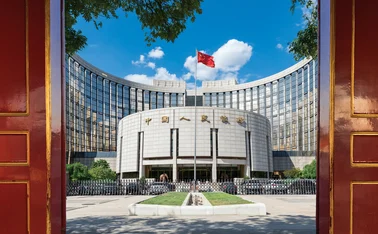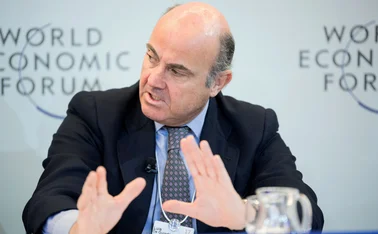
Technology provider of the year: Polaris
Flexible platform has enabled central banks to upgrade many core operations

With a worldwide push for systems integration, payments innovation and financial inclusion, central banks are seeing their systems tested by higher volumes and the demand for ever greater speed and efficiency. Polaris has been well placed to respond to that demand, delivering upgrades to core banking systems at numerous central banks, with the potential for dramatic welfare gains.
Polaris, operating through its products division Intellect Design Arena, has won contracts with the Central Bank of Seychelles (CBS), Monetary Authority of Singapore, National Bank of Ethiopia, Sveriges Riksbank, and perhaps most prominently, the Reserve Bank of India (RBI). Its work with central banks is built around a system dubbed the ‘Quantum Central Banking Solution’ (QCBS), which delivers a modular, flexible platform that can integrate with many other payment systems.
“QCBS has proven and flexible business components under a single high-performance architecture that supports central banks with risk-free progressive modernisation,” says Polaris chief executive Jaideep Billa. “The power of QCBS is evident in its track record across three continents – Asia, Africa and Europe.”
Sriram Vaidheeswaran, chief operating officer at Polaris, describes QCBS as “a system that talks to other systems”. It integrates with other parts of the payment system including Swift, cheque truncation and electronic fund transfers, giving real-time information to both central bank and government. “QCBS facilitates seamless movement of fund and securities between financial institutions, central bank and government,” says Arun Jain, chairman of Intellect Design Arena.
Reserve Bank of India
Polaris started work with the RBI in 2011, winning a contract to overhaul its core banking function, which was heavily reliant on manual work and multiple systems. Prior to using Polaris technology, the RBI would take a number of days to produce annual accounts, and weekly financial reports to the government were also highly time-consuming.
Polaris ripped out the old system, consolidating the disparate moving parts into a single, fully automated platform. The change in timings was dramatic: days dropped to minutes for the annual accounts and weekly financial statements could be produced instantaneously. For the first time in 2014, the RBI was able to start the new financial year without closing down for a day to cope with the accounting backlog. “The system operates in an integrated manner without any manual intervention,” says Gopal Arumbuliyur Doraiswamy, Polaris’s RBI engagement director.
Suchitra Sukumaran, deputy general manager in the RBI’s core banking system, says Polaris had installed the system “in record timing”, as well as a number of other systems. “The entire government accounts in the country, through the RBI’s own offices and the agency mechanism, are consolidated through this platform,” she says.
This year Polaris added a number of new modules to the system, including a portal for retail customers, a ‘government gateway’ for people to pay taxes and obtain receipts, a cheque truncation system, and a reporting system for audits. “We have also recently added some advanced functionalities,” says Selvakumaran Soundararajan, Polaris’s head of pre-sales. “For instance, if any government entity has surplus funds, those funds can be used in repos and reverse repos conducted by the central bank.”
A unique challenge arose in 2014 when a long battle for independence saw the state of Andhra Pradesh split in two and the new state of Telangana created. This meant the formation of a new government and the need for Polaris’s system for government accounts to be divided in two and mapped to the new entities. Everything went according to plan, says Soundararajan: “The entire split of the state government was handled in a seamless way.”
On a smaller, but perhaps more complex, scale, Polaris may soon have to handle the restructuring of the RBI, launched by governor Raghuram Rajan. The central bank’s 26 departments will be grouped into five ‘clusters’, each headed by a deputy governor. But Mithilesh Kumar, business head of Polaris’s central banking division, says this is unlikely to present major problems. “Even the bifurcation of a state did not create too many challenges for us,” he notes.
‘A flexible platform’
The first central bank Polaris worked with was the Central Bank of Seychelles, back in 2010. Polaris won a contract in a competitive tender process to automate the country’s core banking system, which was still largely paper-based.
Mike Tirant, head of the CBS’s banking services department, says the new system “pushed us to another level”. “We had a mass of transactions that was growing, and we were capturing that in paper form,” he says. “It meant we were vulnerable – we did not have proper backup for disaster recovery.”
One of the main benefits Tirant highlights is the ease with which Polaris’s system integrates with other areas of the payment systems. Since the core banking system launched in December 2010, the Seychelles has added an electronic cheque clearing system and an electronic transfer system. Both of these new systems were created by other firms, but they meshed well with the core provided by Polaris.
Kathleen Tyson Quah, a strategic adviser to Polaris, based in the UK, says the system’s adaptability is one of its main benefits for central banks. Each central bank is able to adjust the system’s parameters to meet its own needs as operations change. “It is quite a flexible platform,” she says.
Tirant also points to Polaris’s communication as a strong point. During the initial building of the system, Polaris’s people were based at the central bank. “We could easily talk to the vendor onsite and we were able to get the team to take action on certain issues,” Tirant says, adding that all of these issues were overcome before the system went live.
In addition to building the core systems, Polaris provides support, giving it an ongoing relationship with the central banks it works with. It was this that gave Polaris “the edge” in the tender process, Tirant says.
Looking forward
One of Polaris’s latest projects is for Sveriges Riksbank, where it will be providing a collateral management system. Polaris was awarded the contract in March 2014, with the final system expected to launch in October 2015.
Polaris scored very highly during the tender process, achieving 96 out of 100 points. Shiva Shankar, head of marketing at Polaris, says the main factors that won Polaris the tender were the “readiness of the solution”, as well as its flexibility. “Our pricing was also very competitive,” he notes. Polaris charged a fraction under €2 million ($2.4 million) for the project, which includes support services for eight years. That made it the cheapest contender, a whisker under the nearest competition and substantially below the €8 million charged by the most expensive firm.
In future, Polaris will be doing further work for the Monetary Authority of Singapore, creating an ‘information gateway’ for consumers to compare insurance policies. Polaris’s offering does seem remarkable given the low price, but those who have worked with the company stress their decisions were validated by the results. “Their approach during the process showed that our decision was the right one,” says Tirant.
The Central Banking awards were written by Christopher Jeffery, Robert Pringle, Tristan Carlyle, Daniel Hinge, Arvid Ahlund and Maria Espadinha.
Only users who have a paid subscription or are part of a corporate subscription are able to print or copy content.
To access these options, along with all other subscription benefits, please contact info@centralbanking.com or view our subscription options here: http://subscriptions.centralbanking.com/subscribe
You are currently unable to print this content. Please contact info@centralbanking.com to find out more.
You are currently unable to copy this content. Please contact info@centralbanking.com to find out more.
Copyright Infopro Digital Limited. All rights reserved.
As outlined in our terms and conditions, https://www.infopro-digital.com/terms-and-conditions/subscriptions/ (point 2.4), printing is limited to a single copy.
If you would like to purchase additional rights please email info@centralbanking.com
Copyright Infopro Digital Limited. All rights reserved.
You may share this content using our article tools. As outlined in our terms and conditions, https://www.infopro-digital.com/terms-and-conditions/subscriptions/ (clause 2.4), an Authorised User may only make one copy of the materials for their own personal use. You must also comply with the restrictions in clause 2.5.
If you would like to purchase additional rights please email info@centralbanking.com








